|
|
|
Sort Order |
|
|
|
Items / Page
|
|
|
|
|
|
|
| Srl | Item |
| 1 |
ID:
091843
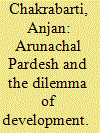

|
|
|
|
|
| Publication |
2009.
|
| Summary/Abstract |
The economy of Arunachal Pardesh is growing at a yearly average of more than 7 percent, and its per capita income is more than Rs. 20000. The share of agriculture to Gross State Domestic product is declining and industry and services are increasing.
|
|
|
|
|
|
|
|
|
|
|
|
|
|
|
|
| 2 |
ID:
133736
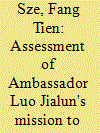

|
|
|
|
|
| Publication |
2014.
|
| Summary/Abstract |
Luo Jialun (1897- 1969) was the first Ambassador of the Republic of China to India. In his tenure as Ambassador to India (1947- 9), he had intensive interactions with leaders of newly independent India. He was also often consulted for his expertise and opinions related to nation building. Unfortunately, his ambassadorship ended in December 1949 after New Delhi decided to recognise the communist-ruled People's Republic of China and break off diplomatic ties with the Republic of China. Acknowledging that Luo's diplomatic career in India has not received much publicity, this article tries to establish the significance of his India mission. The article argues that Luo should not be blamed for the severance of diplomatic relations between India and the Republic of China, which was affected by the global and regional systemic changes resulting from the defeat of the Nationalist government in China. Despite the eventual severance of ties, Luo's passage to India from May 1947 to January 1950 was largely productive. He had relied on his knowledge and experience to fulfil his assignment as an envoy.
|
|
|
|
|
|
|
|
|
|
|
|
|
|
|
|
| 3 |
ID:
025346


|
|
|
|
|
| Publication |
London, ran Nostrand Reinhold Company Ltd, 1970.
|
| Description |
167p.hbk
|
|
|
|
|
|
|
|
|
|
|
|
Copies: C:1/I:0,R:0,Q:0
Circulation
| Accession# | Call# | Current Location | Status | Policy | Location |
| 005419 | 954.03/DOB 005419 | Main | On Shelf | General | |
|
|
|
|
| 4 |
ID:
109713
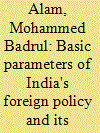

|
|
|
| 5 |
ID:
113607
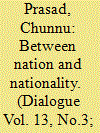

|
|
|
| 6 |
ID:
129890
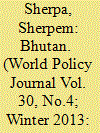

|
|
|
| 7 |
ID:
075566
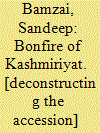

|
|
|
|
|
| Publication |
New Delhi, Rupa and Co, 2006.
|
| Description |
xviii, 290p.hbk
|
| Standard Number |
8129110601
|
|
|
|
|
|
|
|
|
|
|
|
Copies: C:1/I:0,R:0,Q:0
Circulation
| Accession# | Call# | Current Location | Status | Policy | Location |
| 052090 | 954.604/BAM 052090 | Main | On Shelf | General | |
|
|
|
|
| 8 |
ID:
039118
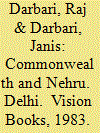

|
|
|
|
|
| Publication |
DelhI, Vision Books, 1983.
|
| Description |
136p.Hbk
|
|
|
|
|
|
|
|
|
|
|
|
Copies: C:1/I:0,R:0,Q:0
Circulation
| Accession# | Call# | Current Location | Status | Policy | Location |
| 022129 | 954.042/DAR 022129 | Main | On Shelf | General | |
|
|
|
|
| 9 |
ID:
139676
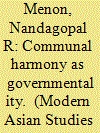

|
|
|
|
|
| Summary/Abstract |
Debates about secularism in post-independence India have often revolved around the visions of two of the country’s founding fathers—M.K.Gandhi and Jawaharlal Nehru. A sharp distinction is drawn between them by those who argue that the Gandhian model (or, what in common parlance and state discourses is called communal harmony) stems from Indian cultural and religious values, and lies beyond the realm of the state. The Nehruvian model, however, is a state project through and through. This article transcends this dichotomy to show that
the association of Nehru and Gandhi with these models does not necessarily mean that secularism and communal harmony faithfully reflect their ideas and, despite the differences in their aims and methods, both models are united in the discourses and practices of the state as strategies of ‘governmentality’. After redefining the core of communal harmony as reciprocity (rather than tolerance), I show how it is performed, how it supplements the state’s efforts to keep the peace in a religiously plural society by the force of law, and shores up the state’s
legitimacy deficit. However, the state’s simultaneous involvement in Nehruvian and Gandhian projects is not an innocuous fact because it undermines the state’s constitutional and secular obligations to non-discriminatory citizenship in the Indian nation. The argument is that the state’s endorsement of dargah-centred Islamic piety as an exemplary site of communal harmony and particular ideas of the Indian nation legitimized by communal harmony ‘problematizes’ the national belonging of certain kinds of pious Muslims.
|
|
|
|
|
|
|
|
|
|
|
|
|
|
|
|
| 10 |
ID:
170990
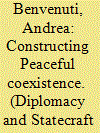

|
|
|
|
|
| Summary/Abstract |
ABSTRACT
In the mid-1950s, Jawaharlal Nehru advanced an alternative approach to regional security, pursuing it enthusiastically. He held that employing diplomacy in accord with the ‘Five Principles’ of peaceful coexistence, regional governments could establish ‘areas of peace’ and achieve ‘collective peace’. China played an essential role in this process, becoming the lynchpin of Nehru’s regional strategy. Although mindful of China’s potentially subversive role in Asia, Nehru downplayed such misgivings, urging Beijing’s commitment to the Principles. By doing so, he endeavoured to ‘create an environment’ where China would find it increasingly difficult ‘to break away from the pledges given’. Furthermore, by supporting China’s participation to the 1955 Bandung Conference, he wished to end Beijing’s isolation and transform India’s giant neighbour into a stabilising regional force. This analysis revisits Nehru’s policy of peaceful coexistence, making a fresh contribution to the study of Cold War India’s external relations. In addition, it explains how such a policy, crucially centred on Sino-Indian rapprochement, took shape and appeared, at least briefly, to make progress and deliver on Nehru’s expectations
|
|
|
|
|
|
|
|
|
|
|
|
|
|
|
|
| 11 |
ID:
000530
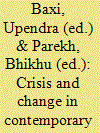

|
|
|
|
|
| Edition |
1st ed.
|
| Publication |
New Delhi, Sage Publications, 1995.
|
| Description |
453p.hbk
|
| Standard Number |
8170364108
|
|
|
|
|
|
|
|
|
|
|
|
Copies: C:1/I:0,R:0,Q:0
Circulation
| Accession# | Call# | Current Location | Status | Policy | Location |
| 041861 | 954.04/BAX 041861 | Main | On Shelf | General | |
|
|
|
|
| 12 |
ID:
106714
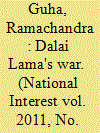

|
|
|
|
|
| Publication |
2011.
|
| Summary/Abstract |
IN THE late autumn of 1962, there was a short, intense border war between India and China. It resulted in the complete rout of an underprepared and poorly led Indian Army. For the two rising powers, the battle-and its outcome-was seen in national, civilizational and ideological terms. These nations were, or at least saw themselves as, carriers of ancient civilizations that had produced great literature, philosophy, architecture, science and much else, but whose further evolution had been rudely interrupted by Western imperialists. India became free of British rule in 1947; China was united under Communist auspices in 1949. The recovery of their national independence was viewed as the prelude to the reemergence of China and India as major forces in the world.
|
|
|
|
|
|
|
|
|
|
|
|
|
|
|
|
| 13 |
ID:
111198
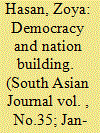

|
|
|
| 14 |
ID:
128493
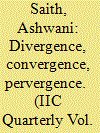

|
|
|
| 15 |
ID:
171864
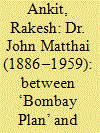

|
|
|
|
|
| Summary/Abstract |
Dr John Matthai held key ministerial offices in New Delhi during a time of transition from pre- to post-independent India. He was Finance Minister twice (1946, 1948–50) and, in between, held the portfolios of Industry & Supply and Railway & Transport. Matthai had been an academic in Madras, an administrator with the central government and an economist in Bombay with the Tata group. His wide expertise and diverse experience brought him a range of opportunities in those partisan times, including as Chairman of Taxation Enquiry Committee (1953) and State Bank of India (1955). Matthai’s ministerial appointments were unusual, his administrative challenges were unfavourable and his exit from government unexpected. In this article, I argue that his short-lived and scattered ministerial life and the record he left of it provides a unique vantage from which to view the interim times of 1946–1950 in India, with their paradigm of ‘continuity and change’.
|
|
|
|
|
|
|
|
|
|
|
|
|
|
|
|
| 16 |
ID:
028661
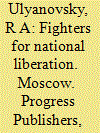

|
|
|
|
|
| Publication |
Moscow, Progress Publishers, 1984.
|
| Description |
175p.Pbk
|
|
|
|
|
|
|
|
|
|
|
|
Copies: C:1/I:0,R:0,Q:0
Circulation
| Accession# | Call# | Current Location | Status | Policy | Location |
| 025961 | 923.2/ULY 025961 | Main | On Shelf | General | |
|
|
|
|
| 17 |
ID:
113502
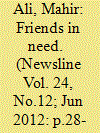

|
|
|
| 18 |
ID:
157084
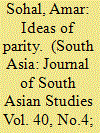

|
|
|
|
|
| Summary/Abstract |
Historians have suggested that the politics of late colonial India centred on a battle between two discrete ideas: Indian and Muslim nationalism. Complicating this binary, this paper focuses on three conceptions of parity between religious groups, contending that this logic transcended Mohammad Ali Jinnah's and the Muslim League's call for constitutional equality between Hindus and Muslims to shape a wider debate about how to defy communal majoritarianism and exit identity politics altogether. Just as Jinnah sought to prevent Hindu dominance within a single state, the Akali Sikhs—influenced as much by a negative historical imagination as the contemporary logic of numbers—produced their own constitutional claim in order to avert Muslim supremacy in the Punjab. Meanwhile Maulana Abul Kalam Azad, president of the Indian National Congress between 1940 and 1946, posited a unique thesis: since modern India was the joint construction of Hindus and Muslims, parity already existed. Though he held that Jinnah's call for constitutional parity was consequently superfluous, Azad's idea of the shared nation led him to search for a genuine consensus, rather than a simple truce, between India's two major political parties. This paper argues that the 1946 Cabinet Mission Plan, offering a degree of parity between communities whilst retaining Indian unity, represented the near-realisation of these three ideas.
|
|
|
|
|
|
|
|
|
|
|
|
|
|
|
|
| 19 |
ID:
184983
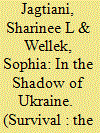

|
|
|
|
|
| Summary/Abstract |
In 2022, India captured global attention over its response to the war in Ukraine. While calling for both parties’ return to diplomacy, India abstained from several United Nations resolutions condemning Russian aggression. For a country that ostensibly subscribes to the values of democracy and territorial integrity, its response appeared frustrating and contradictory, but it is broadly consistent with its long-standing policy of non-alignment. Although India’s relationship with China is increasingly contentious, New Delhi is not yet fully convinced that it is in India’s interest to swing westwards. The country’s relations with Russia and China are deep, complex and substantive. In addition to the military and economic benefits it derives from its connection with Russia, New Delhi and Moscow share an avowed preference for a more equal, multipolar world. India will eventually have to reflect on the extent to which it can sustain its balancing act.
|
|
|
|
|
|
|
|
|
|
|
|
|
|
|
|
| 20 |
ID:
046770
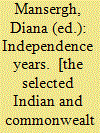

|
|
|
|
|
| Publication |
Oxford, Oxford University Press, 1999.
|
| Description |
xv, 274p.hbk
|
| Standard Number |
0195648471
|
|
|
|
|
|
|
|
|
|
|
|
Copies: C:1/I:0,R:0,Q:0
Circulation
| Accession# | Call# | Current Location | Status | Policy | Location |
| 045581 | 954.03/MAN 045581 | Main | On Shelf | General | |
|
|
|
|
|
|
|
|
|